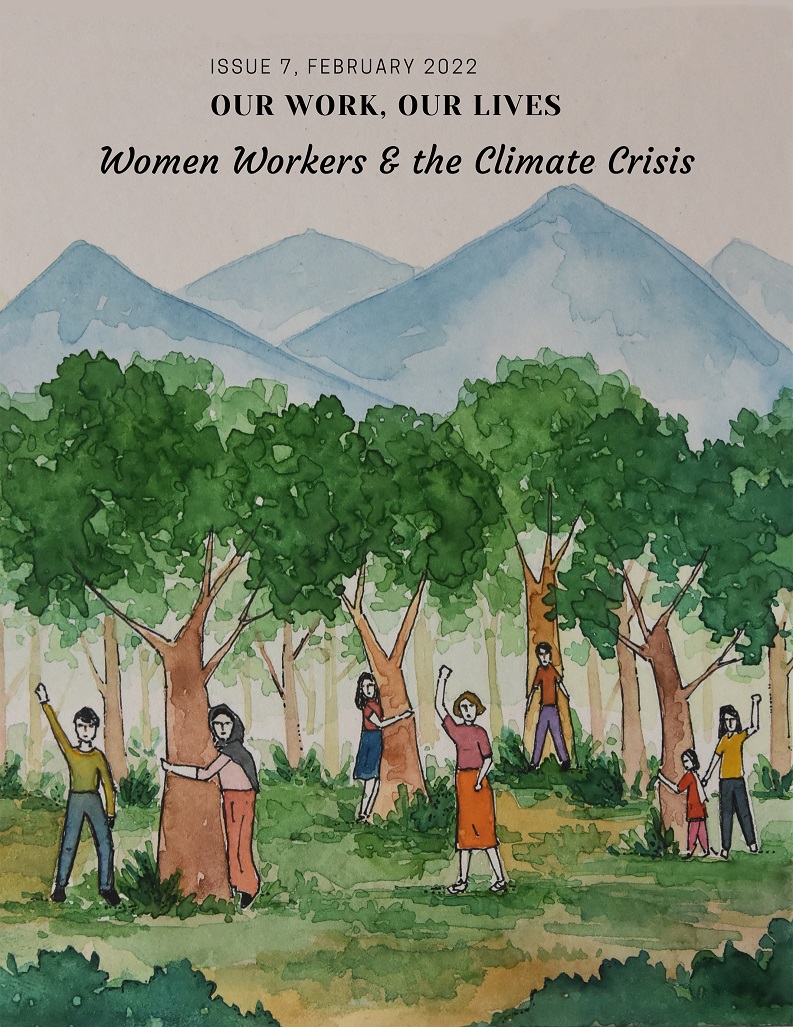Our Work, Our Lives, issue 7: Women workers and the climate crisis

Dear friends,
The February 2022 issue of Our Work, Our Lives focuses on the climate crisis. In preparation for this issue, some self-organised groups of women workers within our alliance and our colleagues working with them held group discussions on the topic of climate change and its impacts on lives and livelihoods. We wanted to know what kind of changes women workers have observed over the years, how it impacts them, and what steps they take to address the challenges.
Interestingly, the topic of climate triggered memories of natural disasters among many groups. Kala aur Katha’s group discussion focussed on the super cyclones in Odisha in 1999 and 2019. Malati Behera remembered that fateful day when she lost her husband and 6-year-old daughter to the cyclone. Reminiscing about cyclone Fani that hit the state two decades later, women artisans from the Dom community in Odisha pointed out how even during a cyclone the horrible practice of untouchability was not forgotten.
Jannath Ferdaus, a Bangladeshi migrant worker in the garment sector in Jordan, recalled how the frequent floods and cyclones in her village displaced her family and eventually resulted in her overseas labour migration. Jane Nungari Njoroge, a Kenyan migrant domestic worker in Jordan noted that state support often does not reach to the people in need. The women’s group that Shramajivi Mahila Samity works with shared that the weather pattern has changed: “Summers are longer and harsher than before. The time of sowing of paddy has also changed, forests are no longer dense. The variety of forest produce is also slowly going down”, they said. Badabon Sangho has highlighted the link between the climate crisis, land rights and violence against women.
The community group in Mabarie village in Sierra Leone where DoWan is working are aware that large scale charcoal burning contributes to environmental degradation. But they are also caught in the vicious cycle of poverty and unemployment and do not know how they can care for the environment without employment creation by the state. Women farmers from the Surabhi Collective in Andhra Pradesh, India share the steps that they have taken to address the negative impacts of climate change in their lives. Colleagues from OKUP have shared their research in the coastal belt of Bangladesh and from Seruni, Indonesia we have a statement issued during COP26.
The climate crisis is worsening and needs urgent action at every level. As we tried to find out the understanding of these issues and resistance action among low wage women workers and working-class communities, we realised that much work is going on at the local level. Some of these actions may not have been framed as movements for climate justice. But our colleagues have been raising their voices against corporate capture of the commons and for their rights to land, forest and water for a very long time. They have also been working towards sustainable agriculture and environment friendly living practices for years. It is time for policy makers to do their work. We will try our best to ensure that these community conversations continue, and local actions are supported.
We thank our colleagues who made time to write for this issue. We are thankful to Tanuja Sethi from Kala aur Katha for the beautiful cover design. The cover page is reminiscent of the Chipko movement in India in 1973 when thousands of women mobilized to maintain the ecological balance and hugged the trees to protest their felling.
You can read the issue as a "flip book" by clicking on the image below or you can download the pdf here.
We hope you enjoy reading the simple stories in this issue. Do write to us with your comments, suggestions, or stories for upcoming issues at This email address is being protected from spambots. You need JavaScript enabled to view it.
Warmly,
GAATW-IS team

